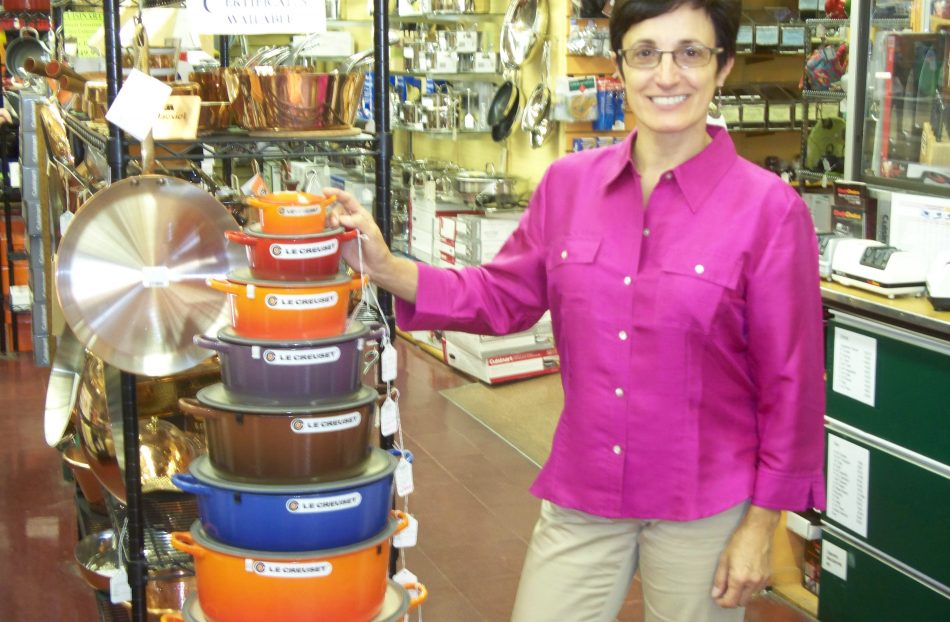
Whether Philadelphians are searching for common kitchen utensils or rare Italian cookware, they can flock to Ninth and Carpenter streets for every chef’s need.
Fante’s Kitchen Wares Shop is one of the very few remaining Italian vendors in Philadelphia’s historic Italian Market, and it’s the oldest cookware shop in the country, in business since 1906.

Mariella Esposito, president of Fante’s Kitchen Wares Shop, said people keep coming back because of the hands-on, personal service and items that are hard to find elsewhere.
“I come here because it is relatively cheap compared to other places,” said Seth Notes, who said he frequents Fante’s at least every two months. “The quality of the items is very good, and the staff knows a lot, and they can help teach you.”
Italian immigrants Luigi L. Fante Sr. and his father Domenico Fante, a stonemason, founded Fante’s as a cabinetmaker’s shop where they mostly made furniture for the kitchen, bedroom and dinning room. Their entire extended family devoted their time to the operation of the business.

When there was no one left who knew how to make the furniture, the remaining family members strived to keep their business prospering by constantly varying it to meet the changing demand for the products and services. They sold furnishings, imported China, crystal and other goods from Europe. After World War II, cookware was added in response to the goods for resale being hard to come by.
In April 1981, the Fante family retired, and the Giovannucci family bought the business. The families became acquainted in the mid 1960s, when the Giovannucci’s emigrated from northern Italy to Philadelphia. Esposito, whose maiden name is Giovannucci, and her siblings worked at the store after school.
The Giovannucci family decided to limit their merchandise to only cookware, expanding from the store’s previous selection as an economical decision during the 1980 recession.
“People would come in and ask what we did with the ‘museum’ in the back,” said Eugenia Dantz, Esposito’s older sister who also works at the store. “Because that’s what people called the back where all of the lamps, tables and imported China.”

Besides transforming Fante’s to specialize in kitchen utensils for both professional chefs and home cooks, the Giovannucci family decided to dedicate a corner of the store to coffee. The coffee shop portion opened in the early ‘80s because there was no place to get espresso.
“Only a few restaurants had espresso and they called it ‘ex-presso,’” Esposito said. “It was not good, so we got a small espresso machine and made espresso for ourselves and to sell.”
Esposito says Fante’s was the first espresso shop in the city in a time when most people didn’t even know what espresso was, unless they had been to Europe. Although, the espresso part of the store was never made into a sit-down because the focus was not on selling coffee to drink but the selling of coffee beans.
“We have the best coffee in the city,” said Caitlin Brown, Fante’s barista, “and everyone of our customers agrees.”

Fante’s sells 70 different types of coffee, which is ground per custom order. They do not sell any pre-ground packaged coffee, and a new shipment of coffee comes in once every week from their various distributors, which is why it is so fresh and has such a good reputation.
Another factor that draws people to Fante’s is their knife-sharpening service. People can bring their knives in to be sharpened for $2 a knife.
Today, about half of the store’s sales are made online.
The family-owned and operated retail business still survives as a representation of the Italian culture in a market where other ethnicities have also taken root.
“Fante’s is all about knowing how and what to use to cook great food,” Dantz said. “And food is the biggest part of the Italian culture.”

Be the first to comment